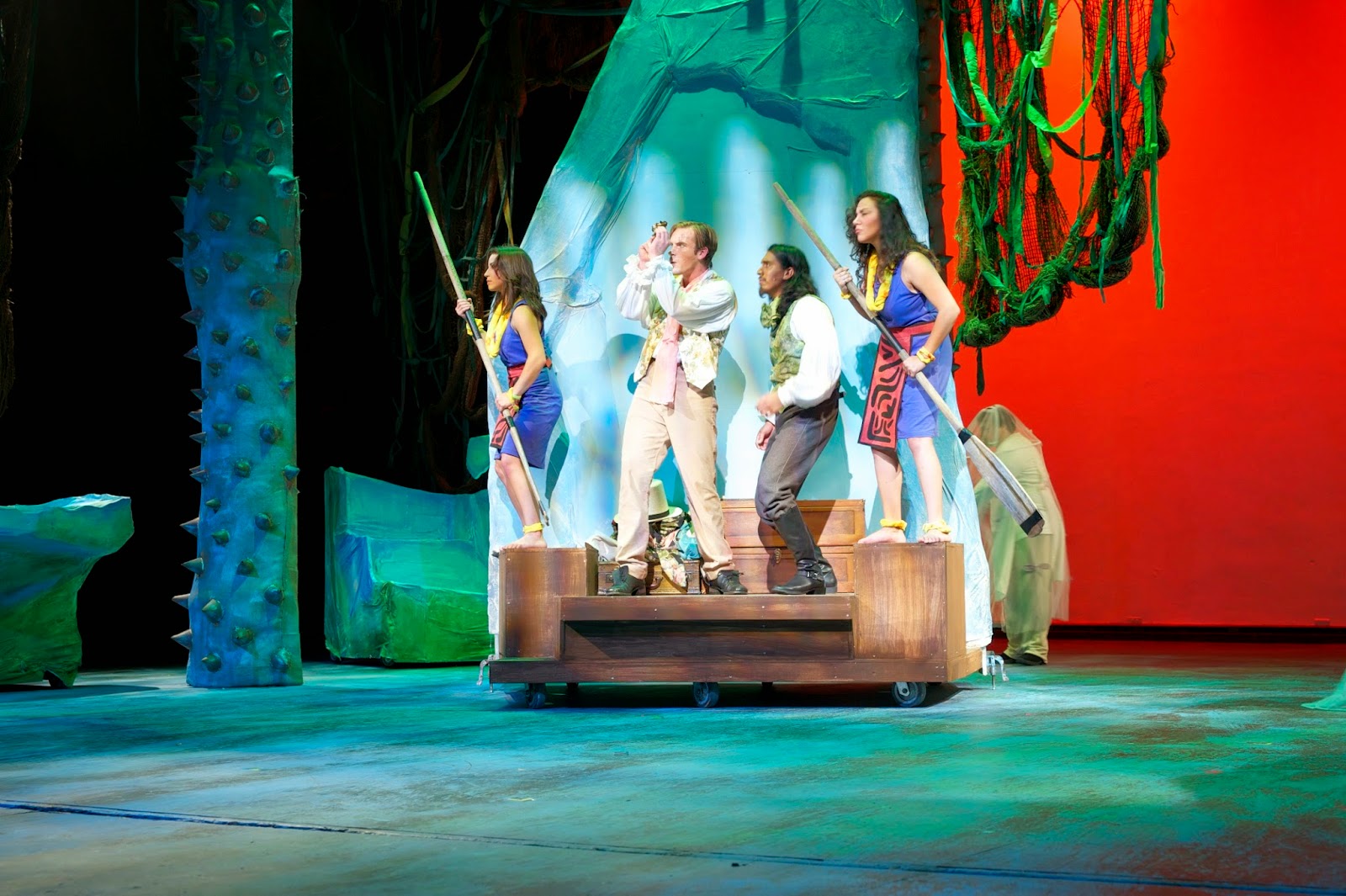 |
| Michael Fields. Photo by Kellie Brown |
North Coast stages depend on a relatively small number of producers, directors, designers and actors who often work on several shows in a given year, before moving on or staying for decades. But even within this context, Michael Fields had a remarkable 2013.
Fields directed four major productions and was responsible for the final script of at least two. This was in addition to his normal duties as Producing Artistic Director of the Dell’Arte Company and as chair of the entire California State Summer School for the Arts Theatre Program. But more than quantity it’s the newsworthy and innovative nature of these productions for the North Coast that requires more notice.
In February Fields directed a contemporary translation of Moliere’s The Misanthrope, called Hater. But this wasn’t at Dell’Arte—it was at HSU, with a cast of mostly HSU students. It was a fast-paced yet heartfelt production, visually bold and with lively and subtle performances, notably by Johani Guerrero.
It was also the first production of this translation outside of New York—which doesn’t happen here very often. Fields had met translator Samuel Buggeln (who is also a New York-based director) and brought him to the North Coast for a week—also an unusual event.
Even while he was adhering to a script in staging Hater, Fields was teaching one of the two classes that helped create Humboldt Unbound from scratch. HSU students and faculty collaborated on shaping ideas for a theatre piece on Alexander von Humboldt for HSU’s centennial year. Fields guided this unprecedented process at HSU (which required political as well as creative skills), wrote the final script, directed the show and tapped Dell’Arte colleagues to help create the sights and sounds of this singular production, which appeared on the Van Duzer stage in November.
And even while Humboldt Unbound was aborning, Fields was working with Dell’Arte International School students on their collaborative adaptation of Victor Herbert’s Babes in Toyland, which returns the Dell’Arte holiday show to a family-friendly narrative as a comprehensible and emotionally satisfying framework for the dazzle within it.
 |
| Joan Schirle in THE COMEDY OF ERRORS |
In between he directed (and in part adapted) The Comedy of Errors for the Mad River Festival, the first play by Shakespeare that Dell’Arte produced in 38 years (and he was in that one.) I wrote at the time that it was one of his best directorial efforts.
I have reservations about Dell’Arte-style “devised theatre” and aspects of the school’s pedagogy, but two mainstays of the Dell’Arte philosophy are practically personified in Fields’ work: his attention to process and his commitment to community. This was not his easiest year offstage, but the care in his work never wavered.
Fields included two quotes in this year’s Dell’Arte holiday greeting: "Far and away the best prize that life has to offer is the chance to work hard at work worth doing." (Teddy Roosevelt) “Wherever you stand, be the soul of that place.” (Rumi) These are words he lives by.
So what else about North Coast stages didn’t make it into the reviews and previews this year? Well, just like every year, a lot of the drama, most of which has nothing to do with the play that’s presented. It’s supplied within the production itself.
For instance: The leading man who leaves a happy musical a few weeks before opening because his girlfriend doesn’t like how he looks at the leading lady. The actors who can’t make eye contact onstage because of what’s happened offstage. The actors who hate their director, the director who can’t stand the actors.
The musical director and the stage director of a musical comedy who are barely speaking. The set that remains the designer’s fantasy until there’s no longer time to do much more than throw some flats together. Rehearsals suddenly turn into group therapy; illnesses or bad behavior turn them to chaos. Passionate liaisons begin and end within the run of a show, so that two strangers at first rehearsals are estranged lovers by the final performance. (Not all of this happened this particular year... at least not necessarily.)
Participants tell these stories, sometimes even to me (though some actors just look at me with a frozen expression that suggests they’re fighting the impulse to back away while holding up a cross.) Besides backstage gossip, I occasionally hear their critiques of their own shows that can be more bluntly devastating than anything I’ve written. Well, anything I’ve published.
While creating a production doesn’t only (or always) involve backstage drama, this should remind us that it’s done by people. And while participants want to produce a good show for audiences, the process itself is often the reason they show up. Applause is nice and necessary, but the process is the point.
It's the journey they take together: they talk about the play, put it on its feet, create its world, solve problems, think about characters, work with each other and see what they can do. Doing it is the chief reward, especially in community and education-based theatre, which is most of what the North Coast offers. Even more than elsewhere, our theatre is subsidized by the work of the people presenting it.

No comments:
Post a Comment